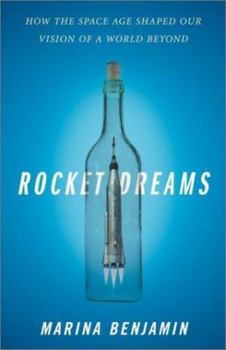Rocket Dreams: How the Space Age Shaped Our Vision of a World Beyond
Select Format
Select Condition 
Book Overview
Remember when the race to the moon held the rapt attention of millions? Remember the Apollo missions that were supposed to herald the beginning of the Space Age? Thirty years after the last moonwalk,... This description may be from another edition of this product.
Format:Hardcover
Language:English
ISBN:0743233433
ISBN13:9780743233439
Release Date:March 2003
Publisher:Free Press
Length:242 Pages
Weight:0.90 lbs.
Dimensions:0.9" x 6.0" x 8.7"
Customer Reviews
4 ratings
Does her homework
Published by Thriftbooks.com User , 18 years ago
Benjamin's book may burn with a sense of a dream betrayed, but her smoldering, often cynical anger never blinds or paralyzes her narrative. Without feigning objectivity, she takes on a very tough question: what does space mean to us? Then she follows it through launch facilities, astronaut autograph sessions, alleged UFO crash sites in Roswell, and, apparently, into many a library. Unlike most space writers, her facts check out completely. She's not kidding when she traces the modern dream of space-going utopias back to aviation fantasists such as Alfred Lawson. This is the guy who wrote in 1916 that airplanes would bring about the next phase of human development, a superior being known as "Alti-man" who would live in the sky. Echoes of this seemingly laughable notion persist to the present day in the lore of UFO enthusiasts and would-be space pioneers alike. Benjamin does a nice job showing how it's also alive and well among cybernauts building virtual-reality worlds for themselves. Rocket Dreams is a brutally honest journey that will shake spacers down to their core beliefs. For everyone else, it will provide loads of dry wit and some good laughs.
Wow!
Published by Thriftbooks.com User , 20 years ago
Sputnik was launched when I was in the [...], and I have followed the space program with rapt attention ever since. But even though I count myself among the geekiest of space buffs, I've sometimes felt that there is a deep contradiction at the heart of the human spaceflight effort. I could never put my finger on it, but Marina Benjamin has. For one, it never occurred to me that the mesmerizing short film "Powers of Ten," which has been widely shown in schools and museums for 30 years, has been unwittingly undermining the case that we will ever go anywhere in the cosmos. Space is just too vast and empty, as that film shows with visceral impact. Benjamin uses another film, the 1972 Russian version of "Solaris," as the jumping off point for this thought: "Is mankind's push into the cosmos the result of a natural drive--an urge as deeply embedded as the other basic impulses, for example, the sex drive? Or are we in our determination to fling ourselves off the planet contravening the very essence of who we are?" Elsewhere, she observes that commerce usually follows in exploration's wake, except that it hasn't really worked out that way for space. "Without successfully accommodating the interests of business, space could never measure up to the 'new frontier' legacy, much less become the 'final frontier'.... It would only be another Everest or another South Pole--which is to say, it would merely be a place whose emptiness and isolation piques our vanity." Wow, has she nailed it! Her book will be upsetting to those who unreflectingly believe that we are destined to spread throughout the cosmos just as we spread across the Earth. But if you're interested in getting at the origin of that peculiar notion and want to have your mind jostled in a myriad of other ways, I encourage you to read this stimulating little book.
What happened to the dreams of Apollo?
Published by Thriftbooks.com User , 21 years ago
This wonderfull book reads like a collection of fascinating magazine articles. The common connection is the human aftermath of the moon landings. From meeting astronauts at an autograph function, to Area 51, to Star Trek, to virtual worlds online to SETI and way out of this world.There are loads of books on the history of flight and the actual space program. This is a book on how we are now dreaming and doing in leaving this pale blue planet. It's very readable, and quite unlike any other book I can think of. Comes complete with a biography of sources and other places to continue your own dreams of space.
Interpreting the Cultural Relic of Spaceflight
Published by Thriftbooks.com User , 21 years ago
The author ruminates on the scarred spaceflight culture that Apollo created and the later space program destroyed. She visits Roswell, New Mexico, with its alien kitsch, and the Kennedy Space Center and Cocoa Beach, Florida, with its gigantic rocket assembly buildings and launch complexes and reminders of the heyday of Apollo, when humans went to the Moon. Now, more than half of the world's population has been born since the last Apollo mission to the Moon in December 1972, and those exciting events seem much less real than previously. She also explores the frontiers of cyperspace, suggesting that this may become the final frontier instead of the Moon and Mars and other places in the universe.






